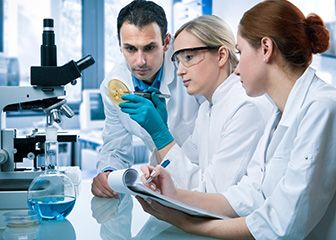Finding a Qualified Resume Writer for a...
|
| Resume Writers... | Thumbnail Review... |
|
www.resumewriters.com | Reasonable pricing, standout writing, and an interview guarantee from the largest network of resume writers on the Internet (representing more than 5 dozen career fields and industries). Guaranteed interviews within 60 days. The BBB gives them an A+ rating. |
|
|
www.greatresumesfast.com | Pricey, yes. But writing is "top shelf" from a team of HR Execs, Hiring Managers and former Recruiters, each detailed on the company's website. Expect an hour-long consultative phone session with your writer. Guaranteed interviews. The BBB gives them an A+. |
Considering a Career Move into Microbiology?
If you're considering a move into microbiology from either a closely related field or from a totally unrelated profession, you'll be looking for a transitional resume -- and a talented resume writer to handle the assignment. Transitional resumes are some of the most difficult resume projects as they require a writer knowledgeable in at least two professions -- and the ability to identify transferable skills from one to the other.
Before you hand off that resume assignment, make sure you know enough about the job of a Microbiologist to... a) really want it, and b) be able to step up to the plate. Here's a quick overview (more information at Wikipedia - Microbiologist):
 |
What You'll Do: Your job entails performing research on all kinds of microbes from bacteria to algae in order to increase scientific knowledge. To obtain this knowledge, you will plan and perform detailed experiments by yourself or with a team, recording data every step of the way. You might work on developing a cure for a certain disease, enhancing genetically-modified produce, or finding new ways to better preserve the environment. Before you begin an experiment, you will collect microbial samples from many different sources including humans, vegetation, animals, food, water, and more. Then, you will examine them using a variety of advanced instruments and methods. After you obtain your results, you will share your findings with scientists and the public, documenting them in reports, electronic databases, scientific journals, encyclopedias, or documentaries. Unfortunately, doing great benefit for society has its risks as many species of microorganisms can be very dangerous for humans upon exposure. Abiding by lab rules and regulations ensures that you and your fellow researchers remain safe in the workplace. Speaking of the workplace, the lab will become your home away from home where you will spend at least 40 hours a week doing your research. |
 |
Education and Training: The minimum requirement for an entry-level microbiologist position is a bachelor's degree in microbiology. This work is usually done under the supervision of a more experienced researcher. If you want to perform your own research, especially at the expense of university funds, you will need to get a Ph.D. in microbiology. This means doing at least 4 to 6 years of post-graduate study involving tons of research, lab work, and essays. At the Ph.D. level, you will be able to publish your own findings, lead and manage a team of researchers, and determine the direction of the research. |
 |
The Future: The profession is expected to grow at about 13% through 2020. Microbiologists who have a broad understanding of microbiology and its relationship to other disciplines (i.e. biochemistry, chemistry, and medicine) should have the best opportunities.. |
 |
The Pay: Annual salaries for Microbiologists in the U.S. range from $39,100 to $115,700, with the average median annual wage hitting $65,200 in 2011 as per the U.S. Bureau of Labor Statistics. |
Still interested in pursuing a position in microbiology? Great. The next step is to prepare for a consultative telephone interview with your resume writer. Treat the coming job search like the business it is, and you'll do fine.
Best of luck,
David Alan Carter, OccupationalResumes.com

Tag or bookmark under:
Microbiologist Resume | Microbiologist Occupation | Resume Writing Services for Microbiologists
_____
NOTE: This website
is monetized through the use of Affiliate Programs with the online providers we review. Read our Disclosure Statement for more information on our Affiliate
Relationships.
|



 Back To
Top
Back To
Top Facebook
Facebook Twitter
Twitter